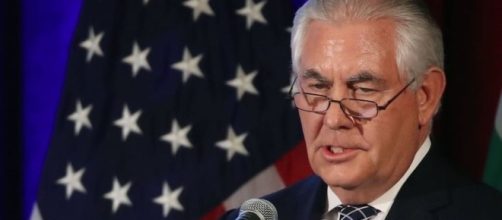Secretary of State Rex Tillerson has accused Iran of provoking the states in the Middle East as the US administration contemplates the possibility of changing its policy towards Tehran.
Tillerson told reporters that the policy review announced on Tuesday will not only be considering whether Tehran respects agreement on Iran's nuclear program from 2015 but also it will investigate the conducting in that region. Tillerson believes that Tehran's attitude is harmful to American goals in Syria, Iraq, Yemen and Lebanon.
Tillerson's attitude corresponds with the statement made by US Defense Minister Jim Mattis, who said during his visit to Arabia that Iranian influence would have to be overpowered in order to end the dispute in Yemen.
President Trump ordered an assessment regarding termination of nuclear sanctions. After the evaluation it would be clear whether that is "crucial to US national interests," Tillerson said.
Tillerson believes Tehran could become a threat just like North Korea
Although there are no indications that the Trump administration might have waived the deal, Tillerson warned that Tehran could become a threat like North Korea, which is also under observation for its nuclear ambitions.
In a letter to President of the US House of Representatives Paul Ryan, Tillerson stated that Iran fulfills its obligations under the agreement made in 2015, but that there is a concern over Tehran's role in providing support to terrorism.
"There are many threats posed by Iran, and our comprehensive policy towards Iran requires solving all those threats," Tillerson told reporters at the State Department.
Tillerson said that the 2015 agreement between Iran and six other world countries, " did not achieve the goal of stopping Iran from becoming a nuclear force."
Iran has not yet commented on the Trump's administration revision, but Iranian leader Ayatollah Khamenei warned in November that Tehran will repent if the US nuclear agreement is violated.
The agreement ignored all the other threats
Tillerson added that one mistake in the drafting of the agreement was that all the other serious threats, that Iran was posing outside its nuclear program, were neglected.
"That is why we must observe Iran in a comprehensive manner in the context of the threat for all regions of the world," he said. "This agreement represents the same flawed approach from the past that has brought us to the threat posed by North Korea," Tillerson said.
The nuclear agreement, which was negotiated at the time of Barack Obama's administration, limited the Iranian nuclear program in exchange for interrupting economic sanctions imposed on Iran.
A new test of Trump's behavior under the nuclear agreement will be in May when he will have to decide whether to extend the abolition of sanctions for Iran signed by Obama. During the presidential campaign, Trump called it the "worst agreement ever" and said that he would revisit it as soon as he came to the office.
Head of European Diplomacy Frederic Mogherini said he was convinced that the US would fully implement the deal. He announced it last month, after meeting with Trump's senior administration officials.

